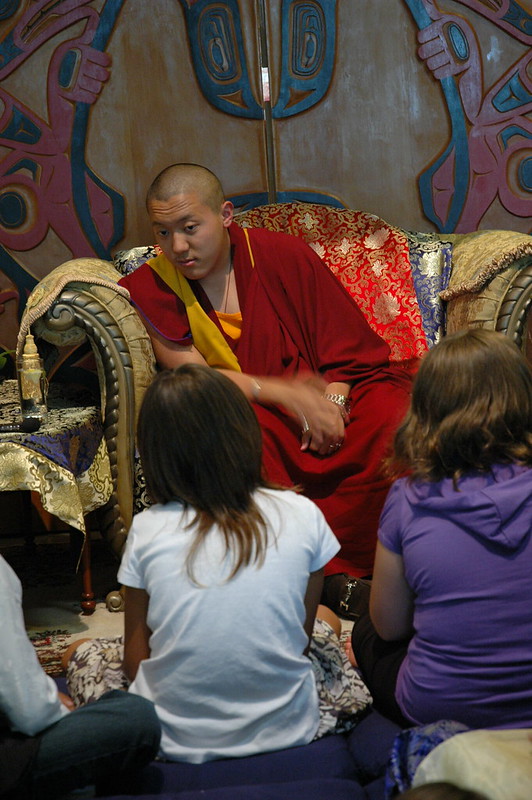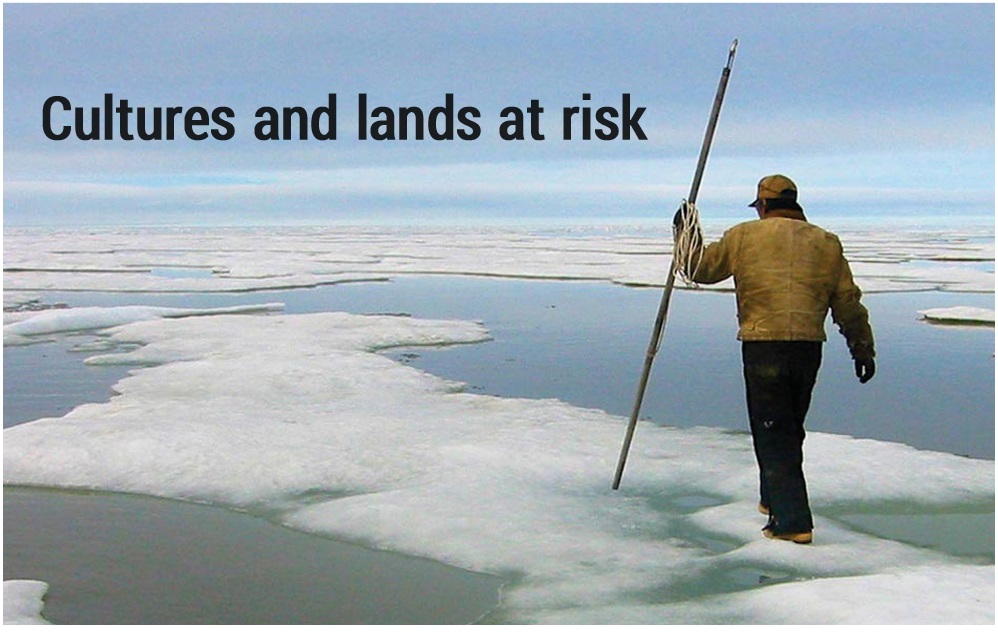10.3. Contemporary Global Society
Global society is a new and distinct form of social life. Over the tens of thousands of years of human existence, the world has never been as integrated. From the point of view of interpretive sociology, globalization signifies a qualitative shift in the nature of the lived experience of everyone on the planet. In particular, it has strong implications for the way in which people understand themselves, conceptualize the problems they face and define their place in the world.
Anthony Giddens (1990, 1991) and others have referred to this new form of life as late modernity. He identifies four key developments that characterize this new period of human existence.
De-Traditionalization
One aspect of the world as a global village that Marshall McLuhan described at the beginning of the chapter is the way it both resembles and no longer resembles the village life of humans that existed for millennia. It resembles that village life because, through the transformation of media and transportation, the world has shrunk. People around the world are in many respects closer, more aware of, and more involved in each other’s lives. They are also exposed to each other’s traditions. But it also no longer resembles that age-old village because, through the same transformations, as well as the formation of a global economy, people lives have become increasingly disembedded from the particularities of local traditions and local cycles of nature.

Giddens describes two concepts involved in this aspect of globalization. De-traditionalization is the process whereby day-to-day life is increasingly less informed by traditions or the ways of life passed down in local cultural and ecological contexts. “For someone following a traditional practice, questions don’t have to be asked about alternatives. Tradition provides a framework for action that can go largely unquestioned” (Giddens, 2002).
Disembedding is the process in which day to day life is no longer embedded in local, micro-level interactions in any simple way but becomes coordinated on a global basis. One has to get up at 3AM for a video meeting with business colleagues in New York or Tokyo, or (back in the day) train their hair stylist to give them a Beatle’s or Twiggy haircut. Giddens describes it as a process that “lifts out social relations from local contexts of interaction” and restructures them “across indefinite spans of time and space” (Giddens, 1991).
What replaces tradition and locality? The hold of tradition — the customary patterns of life, beliefs, rituals of places — and the restraints of local time and space are diminished to the degree that societies are organized extra-locally and globally through expert systems (Giddens, 1990). Expert systems refer to advanced systems of knowledge and practice in science, technology, computerization, communications, law, medicine, and finance, etc., that are required to run the complex institutional arrangements and technological systems that coordinate contemporary global life. The routine of air travel, for example, is guided every step of the way by air traffic control, global satellite systems, digital communications, multilevel security surveillance and detailed international agreements. In the absence of the stability provided by traditions and local knowledge, Giddens argues that reliance on expert systems in global society provides a new source of “‘guarantees’ of expectation across distanciated time-space” (Giddens, 1990). They provide the sense of order, predictability, and stability that local traditions no longer provide.
Globalization
As discussed throughout the chapter, globalization is the process by which people around the world are integrated into a single global society, albeit in “an anarchic, haphazard, fashion” as Giddens (2002) puts it. People have become increasingly interdependent on a global scale. To sum up the key points, the structures of contemporary globalization are driven and defined by (1) the increasingly geographically interconnected processes of global capitalism, (2) the division of the world into the sovereign state system, (3) the system of international relations and the emergence of super-national agencies and institutions like the UN and the WTO, (4) the role of transportation and communication technologies that reduce constraints of time and space.

In terms of the lived experience of people across the world, the local and the global come together as people are exposed to diverse languages, cultures, cuisines, music, religions, current events, economic trends, global markets, and diseases. People interact daily with friends, strangers, family, colleagues, employers, and contacts on the other side of the world in real time.
This has lead, on one hand, to an exposure to the diversification of social life and cultures, which can bridge distances between people or become sites for new and deeper divisions. People live with cultural differences as an everyday norm.
On the other hand, globalization has also lead to the opposite tendency, the homogenization of life. Local cultures become more alike through the commodification, standardization and uniformity of products and processes: McDonald’s restaurants, Hollywood movies, social media platforms, even the architecture of international airports and the design of bank machines.
Finally, people develop a global consciousness as they become increasingly aware of shared planetary conditions and come to grips with global events like climate change, pandemics, economic crises, terrorism, and the threat of nuclear war.
Expressive Individualism and the New Tribalism
This means that through de-traditionalization and globalization, individuals increasingly form their identities in the context of global cosmopolitanism, (literally ‘world citizenship’ from the Greek kosmopolitēs), where a multiplicity of ideas, traditions and customs intermingle. The individual is no longer constrained by local tradition and authority and has to exercise at least some degree of freedom and autonomy in constructing their identity and choosing the cultural practices best suited to them from a variety of available possibilities.
Expressive individualism is the late modern drive to find one’s “self” and to express one’s unique individuality, even in the face of resistance. With the diminishing influence of tradition and the expansion of lifestyle options, the individual’s identity becomes increasingly a product of individual choices and personal achievements. Rather than a predetermined role ascribed by birth, family, custom or social convention, with the rapid changes of globalization there is an expansive and increasingly global range of alternatives to engage with. Once the traditional options for identity can no longer be taken for granted, the individual is compelled to invent their own identity (Bauman, 2004).
At the same time as there is a need to “become oneself,” individuals continue to seek one another out to share common experiences and world views. They seek like-minded others to construct common narratives, which can turn their personal choice of identity into something more meaningful and collective. The new tribalism refers to the emergence of group identities like fundamentalist religion, Antifa, “Freedom Convoy” populism, Indigenous resurgence, Quebecois nationalism, etc., which provide individuals with a means of distinguishing themselves from others. Attachment to cultural, ethnic, political, or religious differences as identity markers provides a distinct place of allegiance or belonging in the face of cosmopolitan diversity. Unlike historical tribalism however, these identities are often based on symbols, imagery and lineages of belief that circulate globally through the media, disembedded from specific localities and traditions.
Risk and Trust
Risk management has become a prevalent element of institutional and individual life in the 20th and 21st centuries. The future is seen as something that can be shaped by calculation and risk analysis. As a result, individuals and institutions have become increasingly reflexive in their activities. They continuously accumulate and examine data to reflect on how to improve their effectiveness and anticipate future threats and problems. Constant monitoring of activities to assess risks, and a readiness to modify practices in response to new information, are hallmarks of contemporary reflexivity.

The scope and nature of these risks change with globalization. As Beck (1992) and Giddens (1990) argue, people are increasingly aware of existential risks like climate change, loss of species diversity, pandemics, nuclear accidents, and weapons of mass destruction that threaten planetary existence. They are also aware of contingent risks to everyday life that emerge from the complex interdependence of global systems: the failure of U.S. subprime mortgage mechanisms that sparked the 2008 global financial crisis or the global effect of a single container ship stuck in the Suez Canal, discussed earlier in the chapter. At the same time, people have become aware of changes in the type of risk they confront. The unanticipated consequences of human interventions into nature, like the effect of fish farming on salmon run collapses, the release of carbon into the atmosphere, fear of mRNA vaccines, or the invention of plastics, define a new category of risk with global implications. Parallel to these risks, humans create their own “institutionalized risk environments” like futures markets or algorithmic trading, which expose the livelihood of millions of people to risky decisions made by a few.
The awareness of global risks establishes an emotional baseline for global society. They are sources of anxiety and insecurity for everyone on the planet. Notably, global integration itself has become a source of risk, which defines a characteristic risk/trust dilemma of late modernity.
To deal with their anxiety, people tend to default to an attitude of trust in the expert systems that govern the complex technical systems that coordinate global life. The scope of the systems, the complexity of the knowledge involved, and the magnitude of the issues presented offer little alternative. However, this creates a distinctive dilemma of global society because people are also aware of the limitations of these expert systems in responding to risks, not to mention the role of the systems in creating risk in the first place. Some reject scientific expertise altogether and invest in “alternate science” that allows global problems like pandemics and climate change to magically disappear. But inevitably the reflexive stance of contemporary forms of life is based on the awareness of the unpredictability and contingency of global existence (the “unknown unknowns”), as well as the fallibility of science and planning. Science itself is uncertain and open to revision. Thus, global citizens are destined to fluctuate between the anxiety of recognizing risks and the uncertainty of trust in expert systems to respond to them.
Media Attributions
- Figure 10.22 Op de set van The Beatles (VARA, 1964), version by Bvspall, via the B&G Wiki website, [Original source: Sound and Vision Archive, catalog number 64228 kb, photo number 34], is used under a CC BY-SA 3.0 NL licence.
- Figure 10.23 Oh really? by Wonderlane, via Flickr, is used under a CC BY 2.0 licence.
- Figure 10.24 Cultures and Land at Risk by NASA Godard Space Flight Center, via Flickr, is used under a CC BY 2.0 licence.

